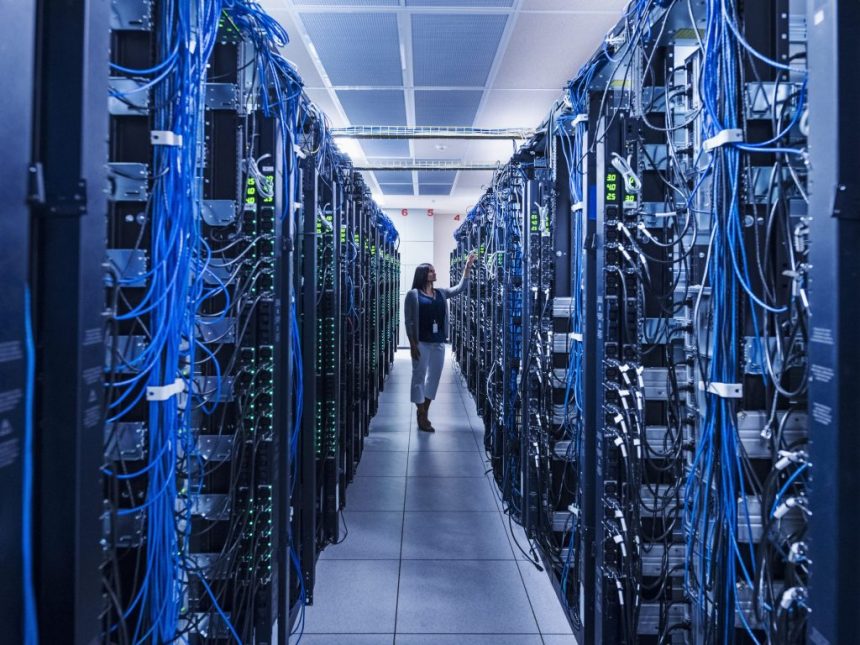Georgia’s data center expansion is rapidly transforming the state’s economic and physical landscape, from metro Atlanta to rural counties. Major tech companies like Amazon, Meta, and Microsoft are investing heavily in the Peach State, buying up land and building massive server farms to power the digital age.
Rising utility bills and environmental impacts caused by data centers have raised concern among advocates across the state due to the fact that these facilities use massive amounts of water and energy.
Meanwhile, state leadership continues to welcome the data center boom. Gov. Brian Kemp vetoed legislation last year that aimed to end tax breaks for data centers, writing in his veto memo that it would ultimately undermine the business community and inhibit “important infrastructure and job development.”
But as the pace of development accelerates, one question remains largely unanswered: How many data centers are there in Georgia?
There is no comprehensive state database that tracks the number, size, or location of data centers across Georgia, which makes the assessment of the full scope of the industry’s presence and impact difficult to analyze.
Some groups, like Science for Georgia, are trying to keep track of all the data centers in the state, as they estimate there are currently almost 100 data centers in Georgia. Another group, Baxtel, estimates that there could be almost 200 data centers in the state.
Science for Georgia also estimates that the current data centers in the state would require the same amount of energy that it takes to power around 3.9 million homes and would need 27 billion gallons of water a year to operate, which the group says is enough water to sustain the entire city of Athens, Georgia, for five years.
Data centers need large amounts of water to operate so that air conditioning can continuously run to keep the computers inside the facility from overheating.
The following map created by Capital B Atlanta shows some of the active and proposed data centers across the state that have been documented by DataCenters.com, a data center research group, and Data Center Dynamics, a data center news organization.
Issues with transparency
Tracking data centers is complicated, as residents have told Capital B Atlanta that knowing when data centers are being proposed in their communities can be a challenge due to a lack of information provided by their local leaders.
In South Fulton, where at least 20 data centers are being proposed, residents have expressed frustration with the lack of transparency in how these projects are approved by their local governments. Some residents say they are often notified only after zoning changes are proposed, and by then, the projects are difficult to stop.
Wanda Mosley, a South Fulton resident and community activist, told Capital B Atlanta that neighbors have struggled to find out about proposed data center developments, much less organize to oppose them, which is why she and other organizers have been working to inform people.
“Union City is very late in sending out information,” said Mosley. “By the time we find out about a data center, it’s often a done deal.”
Some communities have gone down the path of establishing moratoriums against data centers while they figure out how the facilities are impacting their area. In DeKalb County, local leaders were scheduled to meet Tuesday, Oct. 14, to decide if they are extending their moratorium.
While transparency around data centers can be difficult on a local level, several attempts to increase oversight around data centers at the state level failed to pass.
A bill introduced in the Georgia General Assembly this year that would have required energy and water use disclosures for data centers did not pass. Another proposal to tie utility expansion costs to the tech companies themselves instead of ratepayers also failed to move forward.
One of the resources that advocates have used to understand where data centers are being planned in Georgia has been through a state process called Developments of Regional Impact, which provided planners and the public with some data about water usage and infrastructure needs for future projects.
Earlier this year, the Georgia Department of Community Affairs temporarily paused data center review through the DRI process, but has since reversed course and is now looking to create a specific category for data centers in the DRI framework.
Chris Manganiello, water policy director at Chattahoochee Riverkeeper, told Capital B Atlanta that the DRI process has been one of the ways he’s been able to track the impact on water that data centers are creating, and that his organization continues to welcome more transparency around these facilities from the state.
“We’re glad to see that they’ve created a new category. We’re glad to see the data centers will go through this DRI process. That’s kind of the gist of our comments, that we’re very supportive of it, and then it’ll hopefully continue to provide some layer of transparency to what we’re going to see moving forward,” Manganiello said.
The post Georgia’s Data Centers Are Multiplying Fast — and Largely Untracked appeared first on Capital B News – Atlanta.









